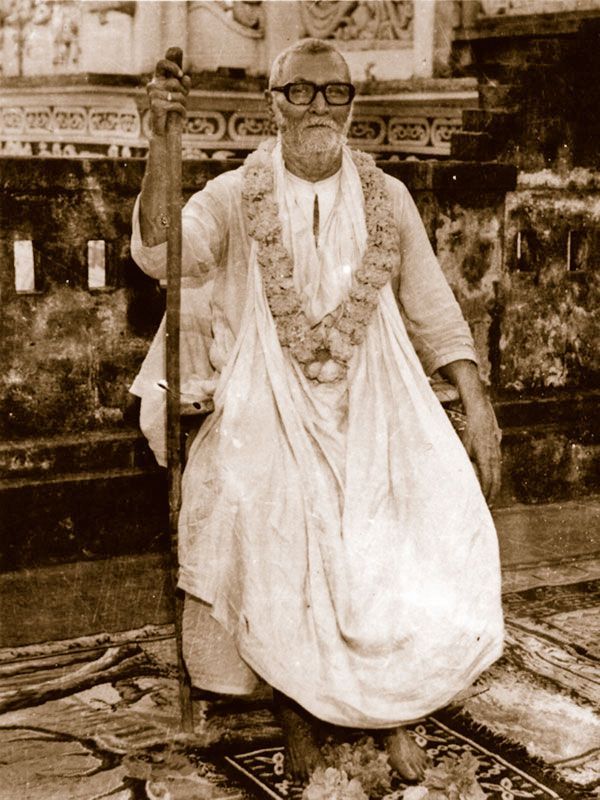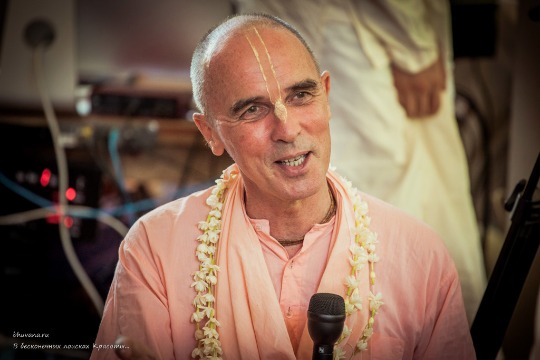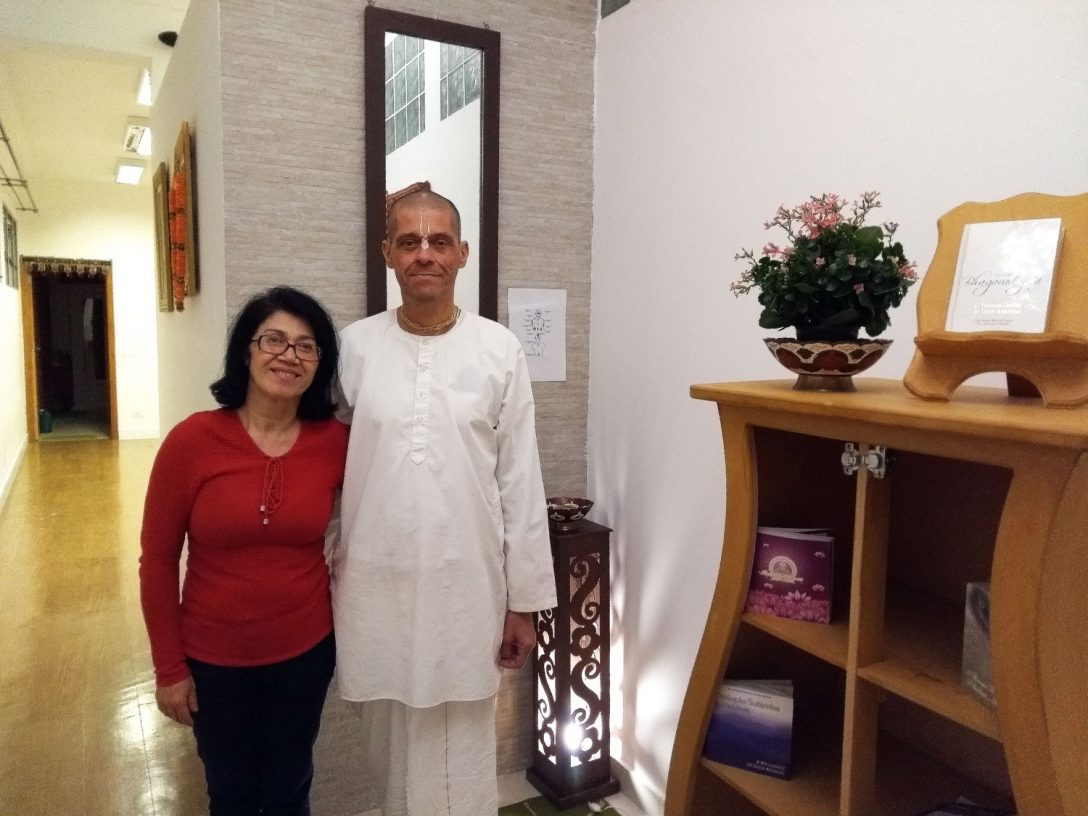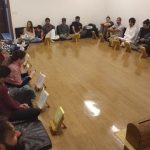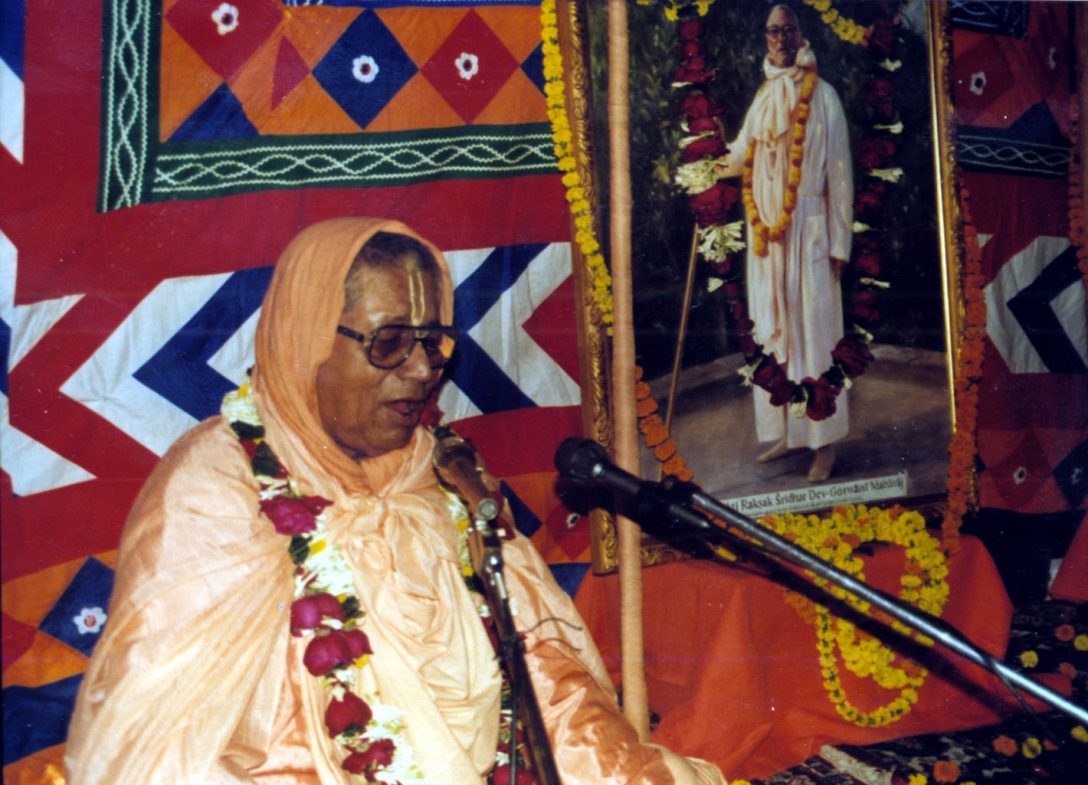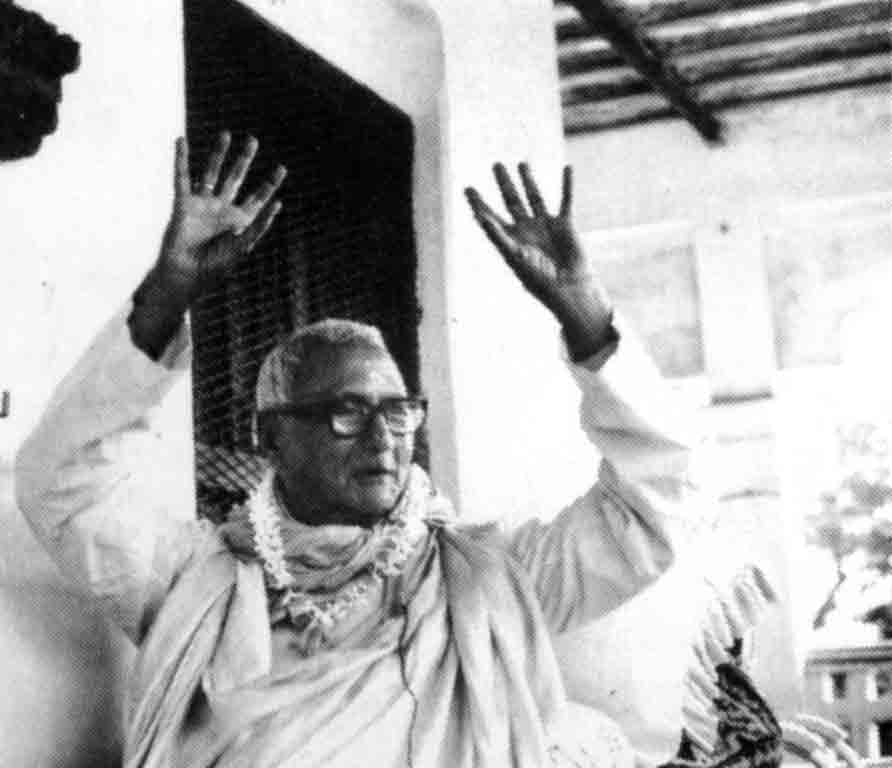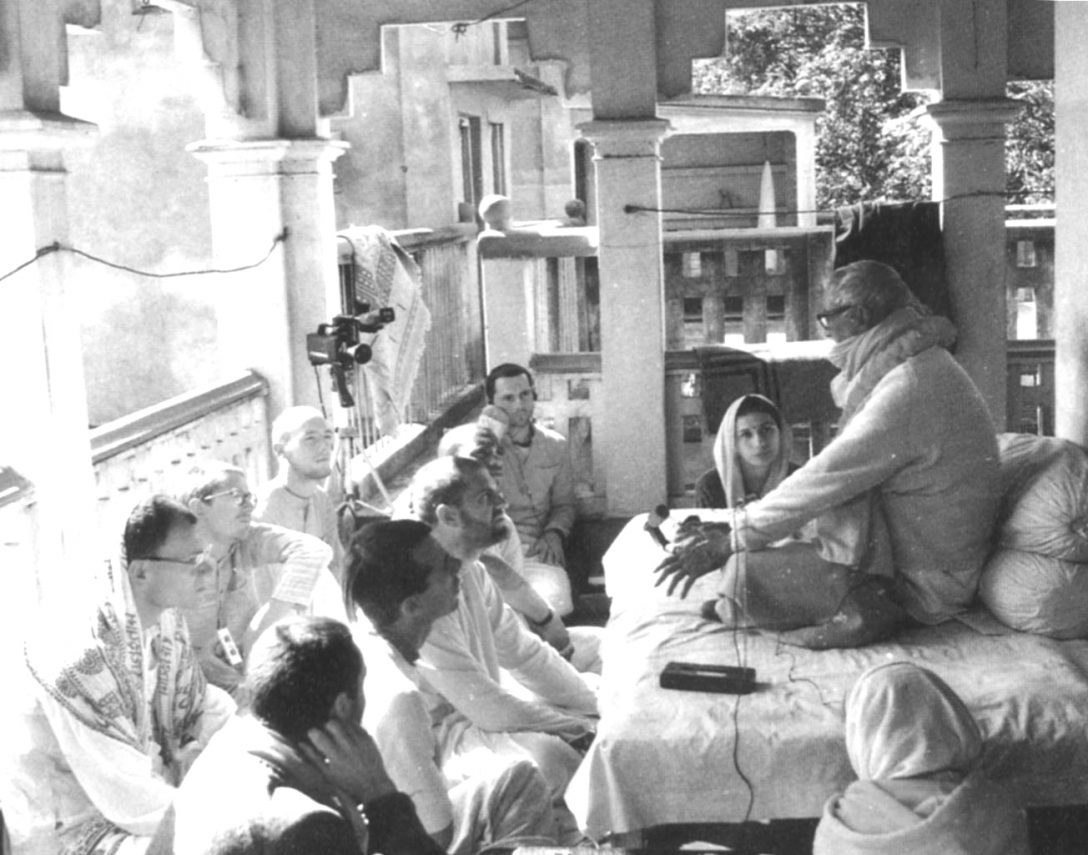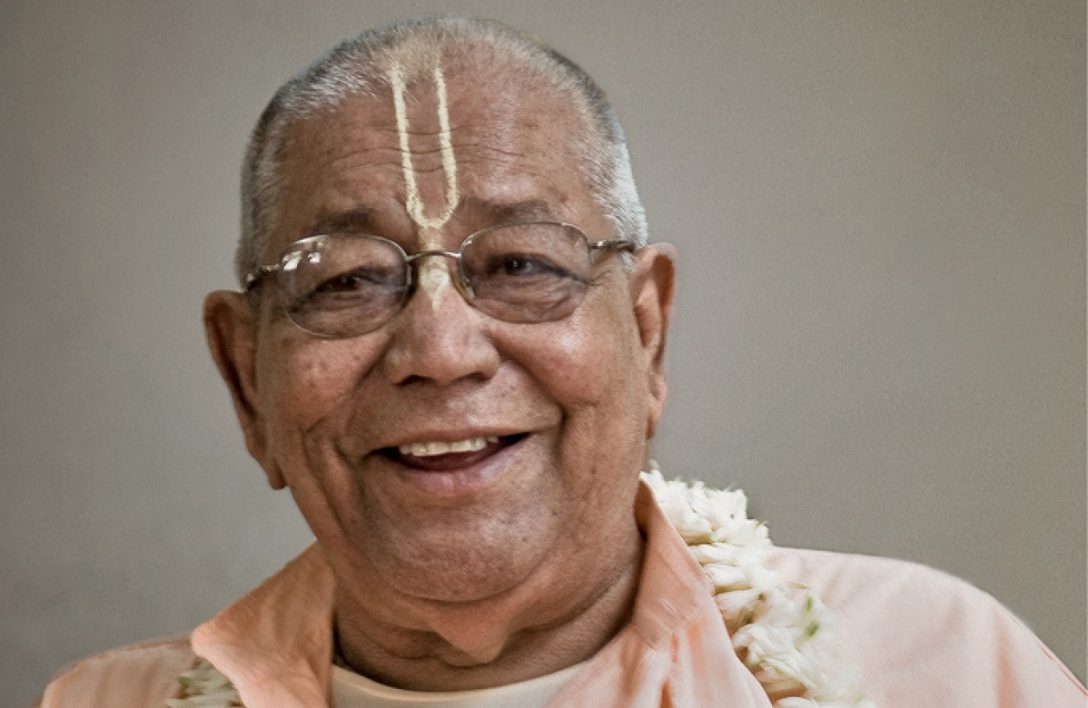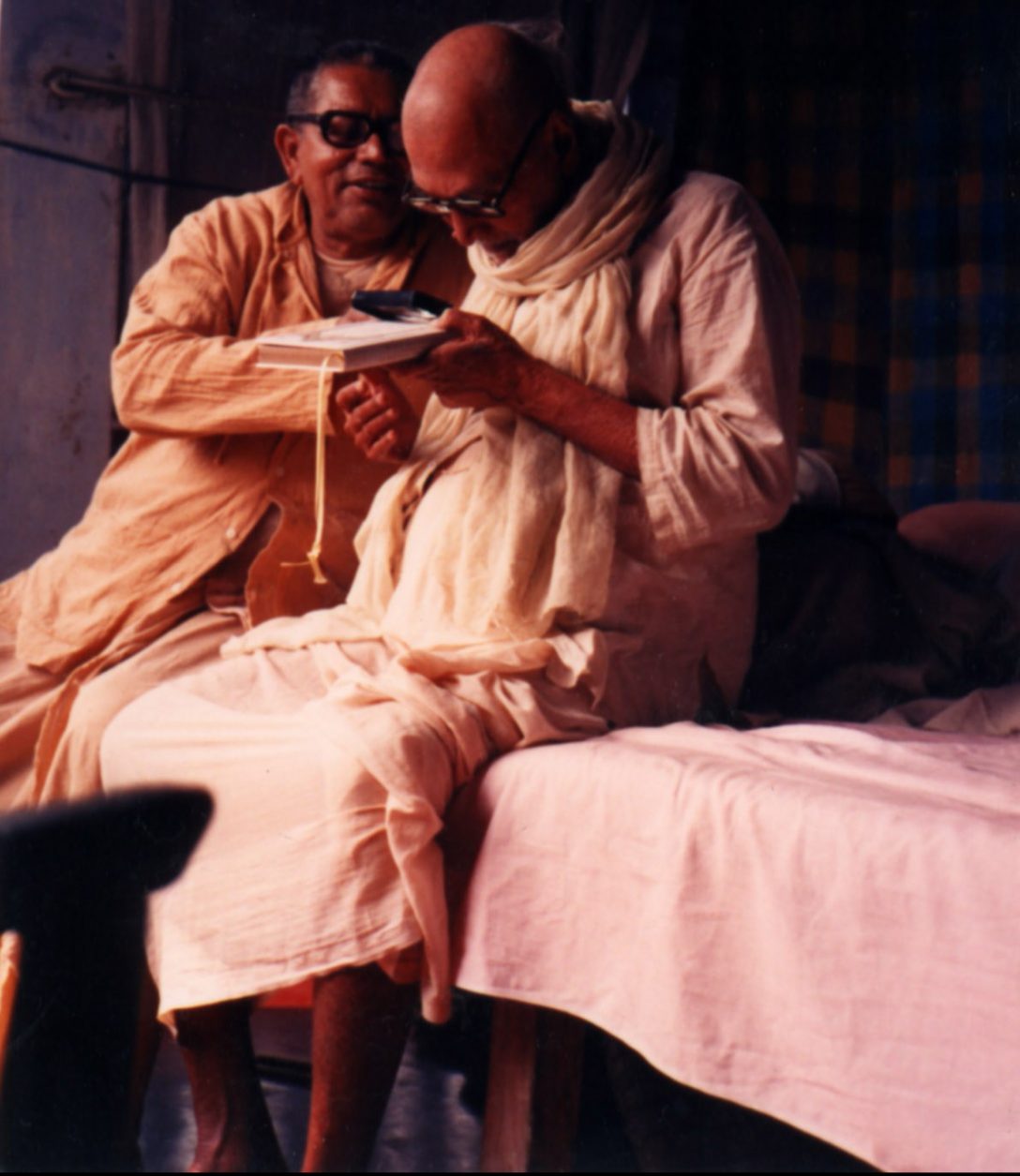If the living being is not guided by their belief in the inner world, or knowledge of dharma, they cannot follow the path of peaceful co-existence. This means that there is no possibility of peace in the negative world until the living being enters into connection with the positive world. When one is in connection with the positive world then one realises the insignificance of ‘small and great,’ ‘profit and loss,’ ‘happiness and distress,’ and ‘victory and defeat’ found within this negative world.
The following article was prepared from a lecture by Śrīla B.R. Śrīdhar Mahārāj in December of 1955 in Sri Nabadwip Dham, and published in Sri Gaudiya Darshan, Vol 01 1955-56, by Śrīla B.S. Govinda Mahārāj.
The present honourable Prime Minister of India, Śrī Jawaharlal Nehru, has suggested ‘peaceful co-existence’ as an antidote to the principal problems faced by today’s extroverted state of world affairs. Everyone accepts that due to the overzealousness of warmongering nations there is a chance of complete annihilation of world peace. If the policy of ‘peaceful co-existence’ is followed to the point, then there will be no necessity of spending millions to finance defence machinery, armies nor will there be a need to invest millions in maintaining the department of defence to protect the country. Instead, if that money is utilised in developing other activities for the country then the nation will become prosperous and the ordinary citizens of the country will be able to live in peace. If the above policy attains more prominence then the necessity of a police force, which is kept for the welfare of the common people, will also reduce—this is a fact. Although it may seem impossible to the human intellect at present, it is a clue to peace and Indian politics.
Now it needs to be seen what is the origin of the aforementioned policy? It is easily discernable to an impartial acute observer—its origin lies in a belief in the world within us, in other words, a belief in the Supreme. If the living being is not guided by their belief in the inner world, or knowledge of dharma, they cannot follow the path of peaceful co-existence. This means that there is no possibility of peace in the negative world until the living being enters into connection with the positive world. When one is in connection with the positive world then one realises the insignificance of ‘small and great,’ ‘profit and loss,’ ‘happiness and distress,’ and ‘victory and defeat’ found within this negative world.
When one studies the history of spirituality, one finds that the mahātmās, who were expert in spiritual topics, instead of focusing on making permanent arrangements to stay in this mortal or external world, utilised their entire endeavour in obtaining ‘membership’ in the internal or eternal world. In such efforts they also achieved success. They only accepted whatever elements or products that were easily obtainable in this world for maintaining their lives. One has to bid goodbye today or some days later to this plane. If one makes permanent arrangement to stay in this temporary ‘hotel-like’ world, they will attain no permanent gain except for increasing the intensity of one’s misery. There are famous mahātmās in history who, in spite of obtaining a very long life spanning many yugas, considered it very negligible compared to eternity. Considering things in this way, they set an example by residing under a tree, absorbed in meditating on the eternal spiritual world. Even some mahātmās considered it a waste of time to collect clothes for the body and remained naked. This is the country of that great culture. Therefore it needs to be seen what are our problems and what are their respective solutions. Needless to say, the policy of ‘peaceful existence’ is only momentarily successful in alleviating the raging problems the world is facing, it is not a permanent solution. This is because the element that creates or forms our problems is the one that possesses the inclination to acquire knowledge and perform activity—namely the consciousness.
In reality, the necessity of food and clothing are not the prime problems. Countries that have sufficient food and clothing and immense wealth also cannot avoid problems. They do not have less problems and suffering. Presently America is the most prosperous country. But if we analyse America a little closer, you will find that those who are famous as the wealthiest amongst them, that are immersed in all sorts of worldly enjoyment, have the highest record of suicide amongst all the countries of the world.
Therefore it needs to be seen where the fault lies. It makes no sense for a person who is completely bereft of food to hope for food, or for one who is ultimately bereft of peace to hope for peace. Similarly, expecting solutions to problems from living entities who are always bogged down by problems is also futile. But the solutions to all problems have been given by the all-knowing Bhagavān Vedavyāsa through the medium of the sun-like purāṇa the Śrīmad Bhāgavata and the Śrīmad Bhagavad-gītā which occupy the highest positions in saintly conclusions. Śrīmad Bhagavad-gītā and Śrīmad Bhāgavata have manifested to provide solutions to the most serious problems ever faced.
From the words of Mahātmā Bhīṣma we come to know that the great warrior Arjuna had the power to defeat a whole army of eighteen akṣauhiṇīs (horse battalions) in a moment—yet in spite of his being so immensely powerful and being capable of creating such massive destruction, he was perplexed in solving the problems that he faced. At that time Śrīmad Bhagavad-gītā appeared.
On the other hand, when we see the position of one who was worshipped as the undisputed sovereign controlling the destiny of all his subjects—when he understood that he had been given seven days notice that he would depart from this world then one can imagine the grave problem confronting him. You will see that his problem far surpasses all other problems commonly faced by us. At that time, that which manifest to give him proper guidance was the Śrīmad Bhāgavata—that which eradicates sorrow, illusion and fear (śoka-moha-bhayāpahā).
Śrīmad Bhāgavata or Bhagavad-gītā have not cultured any sectarian concept. In a universal manner they have given us solutions. Even if we are enamoured by all kinds of problems, they have given us the thing that can give us real peace. For this reason these two suns are shining brightly in all countries for all times in their full splendour.
Take the case of Śrīmad Bhāgavata—when Parīkṣit Mahārāj was deeply concerned about the dilemma he was in after hearing various opinions from great men and sages, at that moment, by divine providence, Śukadeva arrived. The enquiry of Parīkṣit is not that of any particular group or class of people—it is not even confined to the human species—it is relevant to all conscious living beings. At that final moment he only had one question—what activity within this very short phase of time can lead to attaining supreme auspiciousness and transcendental peace? In what way is it possible to obtain the greatest benefit?
Parīkṣit was affected by this problem—the giver of the solution was Śukadeva. One is in an extreme crisis and the other is the solution-giver at that extremely critical situation. On this point there are similar comparative narrations in the Śrīmad Bhāgavata which you can understand in more detail.
Hearing Parīkṣit’s question Śrī Śukadeva, who is self-satisfied and worshipped even by the denizens of Brahmaloka, became satisfied and replied, “O King, this question of yours is not only relevant to you—this question is relevant to the entire world and it is a most pertinent one.
śrotavyādīni rājendra nṛṇāṁ santi sahasraśaḥ
apaśyatām ātma-tattvaṁ gṛheṣu gṛha-medhinām
(Śrīmad Bhāgavatam: 2.1.2)
“O king, those who are engrossed in materialistic household affairs and are blind to knowledge of the self, find thousands of subject matters to hear about within human society.”
In this world from animals, birds, insects (both flying and non-flying), to the different levels of human beings—all are busy trying to satisfy their own requirements. Eating, sleeping, sense gratification, etc. is their requirement, and this requirement is the root cause of all problems. Yet all of them are ignorant of self-realisation (anātmavit). This is because one who is self-realised (ātmavit) only has one program. Those who have not seen themselves—those who have not learnt to see their actual requirement—they will only accept those things that they consider to be necessities. But those who know themselves, who know their actual necessity, will accept your question as the real question or the only question. The program of those who are anātmavit will always be ‘booked’ for eternity. That is because they are gṛheṣu gṛha-medhinām (engrossed in materialistic household affairs).”
The only program of the ātmavit is to be delivered from the clutches of ignorance. A person who has submerged under water—his only program will be to try to save himself. Despite all kinds of external endeavours that are made to improve this world—all such attempts still remain confined to the realm of mortality.
ajñānenāvṛtaṁ jñānaṁ tena muhyanti jantavaḥ
(Śrīmad Bhagavad-gītā: 5.15)
“The living entities are bewildered because their knowledge is covered by ignorance.”
Entrapped in illusion and suffering miserably, those who are anātmavit do not achieve any result other than running from one body to another. Their consciousness is fully covered by ignorance and by identifying themselves with the material body, they revolve eternally, subjugated by birth and death. No immediate relief can be obtained in spite of increasing one’s wealth, followers or equipping oneself with more weapons. House and home, wealth, close relatives and dear friends—none of these things are mine. Even my body does not belong to me. Identifying one’s body as ‘I’ or ‘mine’—this is an animalistic mentality. While I continue to think of these things as ‘I’ or ‘mine’ I will surely continue to face problems. Birth, death, old age, disease—yet at that time I will surely be tricked into transmigrating from one body to another. Thus, in this way, for all eternity, one will never be able to discover the path that will deliver one from these problems.
The Bhāgavata has said, “You have not even learnt how to look at these problems properly. The way to look at these problems is svapne yathā śiraś-chedaṁ (like the cutting off of one’s head in a dream). The man who is sleeping, shouts in his dream, “I have been caught by a tiger!” He only needs to be woken up to solve the problem that he is facing. If he is woken up he will see that everything is fine. He will see that the hope of relief that keeps him absorbed day and night in innumerable programs—those are actually no one’s problem. Śukadeva has said, tvaṁ tu rājan mariṣyeti paśu-buddhih—this means that death is ‘animal conception’. You can’t die! You won’t die! So many types of problems are not yours. Back to God—become situated in the self!
muktir hitvānyathā rūpaṁ sva-rūpeṇa vyavasthitiḥ
(Śrīmad Bhāgavatam: 2.10.6)
“Liberation is the permanent form of the living entity after they give up their gross and subtle bodies.”
Reject any material form! You are a member of the spiritual sky. That which you are thinking is nectar—that is actually poison. What you are thinking is happiness, is sorrow; those things that you consider to be ‘mine’ and ‘yours’ are nothing. It is all ignorance.
asato mā sad gamaya
tāmaso mā jyotir-gamaya
mṛtyor māmṛtaṁ gamaya
(Bṛhad-āraṇyaka-upaniṣad: 1.3.28)
“From falsity, lead me to truth; from darkness lead me to light; from death lead me to immortality.”
Leaving behind ignorance, advance towards light. Make your journey from matter to consciousness—you will be saved from unnecessary garbage—“to make the best of a bad bargain.”
All philosophers that are searching for the self, both in the eastern and western world, say the same thing. All of them say— ‘instead of chasing the hawk outside, first try to touch your own ears.’(1) In the Vedas and other scriptures, various reformatory measures are mentioned for ignorant souls that are mentally deranged to guide them to become truly ‘self-centred.’ When the uncultured souls are disciplined through all these injunctions that will raise them to the plane of the ātma, then they will be able to realise their true identity.
yato yato niśchalati manaś chañchalam asthiram
tatas tato niyamyaitad ātmany eva vaśam nayet
(Śrīmad Bhagavad-gītā: 6.26)
“The nature of the mind is flickering and unsteady. However, one should always endeavour to control the mind from its wanderings and bring it back under the control of the ātma.”
All endeavours progress from ‘shadow’ to ‘substance,’ from ‘phenomena’ to ‘reality.’ It is a one-way journey and this is considered to be real bhūta-śuddhi (purification of the self). Once bhūta-śuddhi happens then everything is solved. Although with pure knowledge one can overlook or ignore one’s connection to this world, again one faces a problem regarding that other (spiritual) world which we try to conceive of from here. Therefore I will speak a little on this topic and conclude my speech.
We find various Āchāryas teaching various ways of how to undergo the journey from the mundane to the spiritual. From our perspective, a constellation of stars may look as if they are all on a single plane in spite of actually being many light years away from each other—similarly there are vast differences amongst the spiritual contributions of various Āchāryas. And if we understand them properly then we will fully realise the unique contribution of Śrī Chaitanyadeva. I have found the solutions to all these topics very beautifully from the Rāmānanda-saṁvāda portion of Śrī Chaitanya-charitāmṛta. Under proper guidance if you read the eighth chapter of the Charitāmṛta you will be able to clearly understand all these things.
Depending on different levels of perfection there are also different levels of endeavour required to achieve them. On the basis of their individual realisations and dedication, Āchāryas have shed light in different directions with the intention of bringing auspiciousness to the lives of all souls. But due to the influence of the wonderful effulgence of Śrī Chaitanyadeva’s supreme magnanimity, other lights have paled into insignificance. The primeval Supreme Lord is the cause of all causes, full of eternity, bliss and knowledge and is the possessor of all opulence, and in order to distribute Himself fully, He Himself glorifies the process of achieving the highest goal attainable by a sādhaka and executes that Himself in order to teach others by His own example. Then only, by His mercy, one can realise Him as the svabhajana-vibhajana-prayojanāvatarī-Bhagavān (the original Supreme Lord whose goal is to come and distribute His own worship and simultaneously taste His own intrinsic ecstasy). Then we can make our lives successful by chanting the praṇāma-mantra spoken by Śrī Rūpa:
namo mahā-vadānyāya kṛṣṇa-prema-pradāya te
kṛṣṇāya kṛṣṇa-chaitanya-nāmne gaura-tviṣe namaḥ
“O most munificent incarnation! You are Kṛṣṇa Himself appearing as Śrī Kṛṣṇa Chaitanya. You have assumed the golden colour and You are distributing love of Kṛṣṇa. We offer our respectful obeisances unto You.” (Cc: 2.19.53)
We can briefly find a summary of the most vital essence of the ambrosial teachings of Śrī Chaitanya in the Rāmānanda-saṁvād. Mahāprabhu, during His ‘human-like’ Pastimes asked, paḍa śloka-sādhyera-nirṇaya—“With the help of evidence from proper authorities, explain the goal for which one should engage all their endeavours.” This question regarding the ultimate goal arises in the heart of the living being due to good fortune accumulated over several lifetimes. In the first sūtra of the Vedānta philosophy, athāto Brahma jijñāsā, the Āchāryas have presented that conclusion in an elaborate and clear way. Here Mahāprabhu desires to listen to the answers to these questions in a straightforward manner from Rāma Rāya. Why?
sa yat pramāṇaṁ kurute lokas tad anuvartate
(Śrīmad Bhagavad-gītā: 3.21)
“Whatever standard a great man sets, the whole world will follow.”
It is not a question of merely repeating something, but to prove it through śāstric reasoning with the help of authorised evidence. In the process of answering Mahāprabhu’s questions, Rāmānanda continued to raise various important theories and in this way he gradually concluded by arriving at the highest stage of achievement.
Rāya kahe, “Sva-dharmachāraṇe Viṣṇu-bhakti haya”: What is one’s true duty (sva-dharma)? It is performing one’s activities according to varṇāśrama. What is the sadhya (the ultimate goal)? It is devotion to Viṣṇu. Who is Viṣṇu? Viśvaṁ vyāpnotīti (He that pervades the entire universe). The knower of the field of activity (kṣetra-jña), namely the soul within the body, and the very soul of the soul, is Viṣṇu. He is the ‘owner;’ the internal substance of the whole cosmos. Aṇor aṇīyān mahato mahīyān (‘He is the smallest of the smallest and the greatest of the greatest’—Kaṭha-upaniṣad: 1.2.20). His satisfaction is the ultimate goal. Here, Rāya Rāmānanda has taken the side of the moralists (nīti-vādīs) and said that the ultimate way to attain devotion to Viṣṇu is by following one’s dharma according to varṇa and āśrama. However, Mahāprabhu said that realising one’s relation with the Lord through the medium of varṇāśrama is restricted within the boundaries of the material world—eho bāhya, āge kaha āra (“This is external, speak more!”). In other words “Such a process is meant for those who are preoccupied with externals. It is a long process. Therefore speak about the ‘direct approach’.” Then—
prabhu kahe, — “eho bāhya, āge kaha āra”
rāya kahe, kṛṣṇe karmārpaṇa—sarva-sadhya-sara
The Lord said, “This is external, speak more!” Rāmānanda said, “To offer the results of one’s actions to Kṛṣṇa is the essence of all perfection.”(Cc: 2.8.59)
prabhu kahe, — “eho bāhya āge kaha āra”
rāya kahe, —“svadharma-tyāga, ei sādhya-sāra”
(Śrī Chaitanya-charitāmṛta: 2.8.61)
“The Lord said, “This is external, speak more!” Rāmānanda said, “Giving up one’s occupational duties according to the system of varṇāśrama is the essence of all perfection.”
prabhu kahe, — “eho bāhya āge kaha āra”
raya kahe, —“jñāna-miśra-bhakti—sādhya-sāra”
(Śrī Chaitanya-charitāmṛta: 2.8.64)
The Lord said, “This is external, speak more!” Rāya Rāmānanda said, “The essence of all perfection is devotion mixed with knowledge.”
Karma-miśra bhakti (devotion mixed with fruitive work), naiṣkarma (activities free of karmic reaction) and jñāna-miśra-bhakti (devotion mixed with empirical knowledge)—these are not the ultimate goal nor are they the means to achieve it. Although there is delineation of progressive advanced stages, each of them has a mood of considering oneself knowledgeable or a certain consideration of measuring oneself. Each of them is tinged by māyā. But then—
rāya kahe, —”jñāna-śūnya-bhakti sādhya-sāra”
(Śrī Chaitanya-charitāmṛta: 2.8.66)
“Rāya said that bhakti devoid of jñāna is the essence of spiritual practice.” Then Mahāprabhu said, eha haya—meaning that, “Now the real path is being taken.” Jñāna-śūnya-bhakti (devotion free of knowledge) is the starting point of true devotion. Even in the Bible we see that the fruit of the Tree of Knowledge is the cause of fall down. “I want to understand everything!”—this tendency must be rejected. This is because the very intelligence to estimate is faulty by nature. What to speak of knowing Him with our tiny brains, we cannot even fully measure a small atomic particle! For this reason the Bhāgavata has given the following point, jñāne prayāsam udapāsya namanta eva jīvanti—your capability to grasp reality is very insignificant and limited. There are personalities who know about your real benefit innumerable times more than yourself! You simply need to hatefully reject (udapāsya) your desire to be ‘all knowing’ and embrace the path of namanta eva jīvanti (dedicating your life serving the Lord). You will see—just like being in an elevator or a lift, you will be raised to a position in Vaikuṇṭha. Whatever was binding you will become your obedient follower. And moreover, san-mukharitāṁ bhavadīya vārtām—once you learn to give a submissive hearing to this, you will see that your journey through eighty-four million species will be terminated. And where should you apply your hearing? You should hear from the one who can properly guide you. There should be ‘guidance proper’. Only this will save you. Whatever condition you are situated in (sthāne sthitāḥ), from there itself you attend. You will see that everything will become clear. This is because only the words of the Bhāgavata emanating from the lips of a sādhu can save us. For the one who follows this, in spite of the Supreme Lord being impenetrable, difficult to attain, and of an unconquerable nature, ultimately they can conquer Him. Throughout the Bhāgavata there are phrases such as, bhaktyāham ekayā-grāhyaḥ (“I am attained only by devotion”).
Under the shelter of sādhu-saṅga and jñāna-śūnyā-bhakti, even ordinary people can attain service to the Supreme Lord, whereas without it, even an intellectual giant cannot. For this reason Baladeva Vidyābhūṣaṇ, in his commentary on the Vedānta, has proven the importance of sādhu-saṅga by citing various evidences. The sādhu is the ‘living source’. Even if one has no good quality, due to the influence of association of a sādhu one becomes sarvair guṇais tatra samāsate (“all good qualities reside with him”). Due to the influence of sādhu-saṅga even a very abominable person can become an instrument of service to the Bhāgavata. Seeing with an attitude of worship or service is Vaikuṇṭha-darśana.
Many, like Miss Mayo (2), in spite of having preached about the filthiness of such worship, have actually never experienced even a slight trace of true worship. They will be thousands and thousands of miles away from the proper understanding of worship. One who is able to approach it with a true mood of worship has nothing to fear. Fear itself runs away upon seeing such a person. One who takes shelter of such a worshipful attitude completely destroys all filthy sentiments and misconceptions—that very auspicious intelligence is the only way to be delivered from the bewildered consciousness that we are in.
We find this teaching in the Bhāgavata verse vikrīḍitaṁ Vraja-vadhū. Your misconception, your malady, your ‘heart disease’ of lust will be cured completely if you can take shelter of a worshipful attitude. Did those who composed the Liṅga-purāṇa and other texts not have even a little common sense like you? Did they have less knowledge and intelligence than you? But still they wrote—still they wrote for our benefit—from the plane beyond lamentation, illusion, and quarrel. Why? Their sole intention was to release us from the fear of the ghost of this material world—to permanently bury our ideology of enjoyment, to frustrate our materialistic mentality. Lest persons see Bhagavat-tattva from a mundane perspective, Śukadeva Goswāmī, who already had knowledge of Brahman (brahma-jñāna) and was completely self-satisfied (ātmārāma), warned the great assembly of principal religious leaders like Atri, Vaśiṣṭha, Chyavan, Agastya etc. when he introduced himself—“You all know that I am well situated in the realisation of the nirguṇa plane, therefore you should remember—if my mind becomes enchanted by the narrations of someone’s character and I become so attracted that I forget everything, then those stories cannot be about an ordinary mundane person who is full of lust. I never speak about things pertaining to this world. I am presenting to you the summum bonum, and without taking shelter of His feet, no auspiciousness can be obtained.”
tapasvino dāna-parā yaśasvino
manasvino mantra-vidaḥ sumaṅgalāḥ
kṣemaṁ na vindanti vinā yad-arpaṇaṁ
tasmai subhadra-śravase namo namaḥ
(Śrīmad Bhāgavatam: 2.4.17)
“I offer my repeated obeisances unto the Supreme Lord, who is all-auspicious. Without offering their actions unto Him, neither the performers of austerities, nor the great givers of charity, nor the mystics, nor those who are expert in Vedic mantras, nor those who are most virtuous can attain any result without dedication to Him.”
Saying this, he established the transcendental platform of his dialogue. Therefore those who see Kṛṣṇa or His Pastimes with mundane intelligence, are not only deceived, but they also commit a great offence, and as a result they never obtain darśana of Śrī Chaitanya and their own identity remains concealed from them.
Bhagavān is supramundane (turīya-vastu). Everything about Him is satyam, śivam, sundaram (comprising of reality, auspiciousness and beauty). In every way Śrī Chaitanyadeva has declared to the world that His worship is beautiful, and the method of that worship is also so beautiful that any person can achieve it by following the path shown by Śrī Chaitanya—
govindābhidam indirāśrita-padaṁ hastastha-ratnādivat
(Siddhānta-ratnam 4)
“He that is known as Govinda, whose feet Lakṣmī takes shelter of, becomes like a jewel in the hand of His devotees.”
The Lord becomes just like his play-doll. And that itself is the highest manifestation of the supremacy of the all-powerful independent Bhagavān (sarva-tantra svatantra Bhagavān). For this reason Kavirāj Goswāmī has said, Kṛṣṇera yateka khelā sarvottama nara-līlā (‘The most attractive play of Kṛṣṇa is His human-like Pastimes’—Cc: 2.21.101). This is the ‘fullest adjustment’ of the Lord’s form—sarvottama nara-līlā—where His devotees, who have taken shelter of Him, see His ‘all-accommodating’ form as atulaṁ Śyāmasundaram (the incomparable Śyāmasundara) and completely serve Him eternally in five rasas. This is the very zenith of achievement.
yaṁ labdhvā chāparaṁ lābhaṁ manyate nādhikaṁ tataḥ
(Śrīmad Bhagavad-gītā: 6.22)
“Upon gaining this, one thinks there is no greater gain.”
Śrī Chaitanyachandra has made that thing which is very rare to achieve into something which is very easy to achieve. That is why He is the most munificent and magnanimous. For this reason Śrīla Prabhodhānanda Saraswatīpāda has exhorted and appealed very earnestly to the souls of this world to take shelter of Śrī Chaitanyachandra’s feet by saying:
dante nidhāya tṛṇakaṁ padayor nipatya
kṛtvā cha kāku-śatam etad ahaṁ bravīmi
he sādhavaḥ sakalam eva vihāya dūrāt
chaitanya-chandra-charaṇe kurutānurāgam
(Śrī Chaitanya-chandrāmṛta: 8.90)
“Taking a straw between my teeth I fall at your feet and beseech you again and again, ‘O noble men, whatever you know, please cast it far away and cultivate attachment for the lotus feet of Śrī Chaitanyachandra.’”
FOOTNOTES:
(1) This refers to a Bengali proverb which advises a foolish man to first touch his ears to be sure that they are still there before running after a hawk, whom he thinks has stolen his ears.
(2) Katherine Mayo (1867-1940) was an American historian and political writer. Mayo became notorious for her book Mother India in which she denounced Indian culture and religion. The book was condemned by many for its racist tone and in a review of the book, Mayo was criticised by Gandhi as having the mentality of a ‘drain-inspector’.
Original Bengali text: Samasya O Samadhan (Pages 196-198_230-232 in Vol01_1955-56)
Special thanks to Swami B.K. Tyagi and Krishnendrani Devi Dasi for their assistance in preparing this article.

